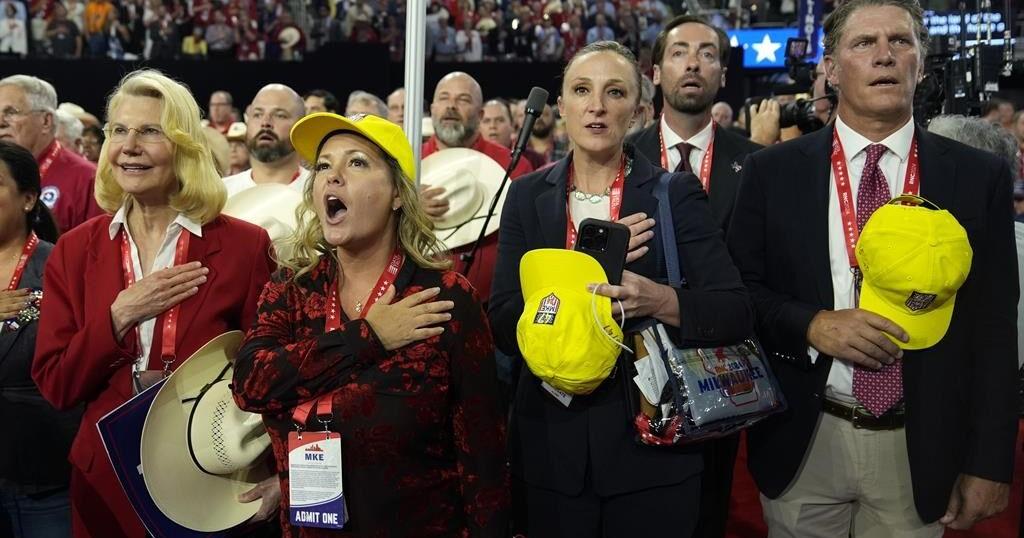MILWAUKEE – Three days after the Saturday shooting at a Donald Trump rally in Pennsylvania, Republican party faithful streaming through the streets of downtown Milwaukee were turning the episode into a source of courage rather than fear.
“I think the courage he had, I think the love for his party and the United States showed,” Anne Reyes said.
Red-clad supporters seemed to wear their faith in the resilience of the former president as armour during Day 2 of the party’s national convention — and its theme, “Make America Safe Once Again.”
Speakers Tuesday focused heavily on tried-and-true messaging about crime and illegal immigration.
Trump has given speeches about securing the United States-Mexico border at rallies across the country, and Republicans see the debate as an area of strength.
But it’s not just the southern border at stake, with some right-wing lawmakers looking north.
Former South Carolina governor Nikki Haley is among those who have called for tougher measures at the Canadian border.
She was Trump’s last major rival in this year’s primary process and wasn’t initially on the slate of speakers, but confirmed she would talk at the Milwaukee event hours after the assassination attempt.
“President Trump asked me to speak to this convention in the name of unity,” she told the crowd at the convention.
Fears over border security are not isolated to the American political playbook.
Asylum seekers also came up as Canada’s premiers met in Halifax for the Council of the Federation conference.
Quebec’s François Legault, with the support of Alberta Premier Danielle Smith, said it’s clear the current situation in his province must change. He said some 190,000 asylum seekers now enter Quebec each year.
“The future of French on the Island of Montreal is in play,” Legault said.
During his first presidency, Trump’s policies on immigration and refugees contributed to a steadier flow of people crossing into Canada, with the largest number arriving at Roxham Road, an unofficial crossing between New York and Quebec.
The Safe Third Country Agreement between Canada and the U.S. means that people cannot claim asylum after legally crossing the border, because each country considers the other to be a safe place.
But a loophole allowed many people who skirted the official crossings to make a claim. Nearly 60,000 people did so after arriving in Canada from the U.S. between 2017 and 2020, about 40 per cent of whom were U.S. residents with precarious status.
The increased volume continued even after the Trump presidency wrapped up.
In 2023, Prime Minister Justin Trudeau and President Joe Biden moved to close the loophole in their bilateral agreement, but despite fewer people making asylum claims — 15,000 from people crossing into Canada from the U.S. at unofficial border crossings in 2023, compared to 40,000 in 2022 — the Quebec government has continued sounding the alarm.
Allison Prasch, an associate professor at the University of Wisconsin, said it’s not unusual for political parties to campaign on safety or illegal immigration.
“Citizens want to believe that their government will keep them safe,” the expert on U.S. presidential rhetoric said. “I think that is a desire that transcends political parties.”
Focusing on crime and illegal immigration creates an us-versus-them dynamic that can be a powerful tool to win support.
All Trump has done is ramp up that rhetoric, Prasch said: “He was just willing to say the quiet part out loud.”
Following last weekend’s attempted assassination, there’s a new narrative building around the former president, she said: in the face of violence, safety concerns and crime, Trump is resilient.
“He can rise above the chaos, literally and metaphorically,” said Prasch, adding she would be watching to see how would-be voters receive that message.
“If you came here illegally under Joe Biden, you are going back to where you came from under Donald Trump,” said Jim Banks, a Republican candidate for Senate, to roaring applause Tuesday night.
Trump isn’t officially scheduled to speak at the convention until Thursday, but has appeared for portions of Monday and Tuesday night, his right ear covered in a white bandage.
Officials confirmed Trump’s ear was pierced by a bullet when a man with an assault weapon fired from a rooftop near a rally Saturday afternoon. A rally attendee was killed and two others critically injured, before the gunman was shot by a member of the Secret Service.
Republican Billy Pollard predicted that Trump’s strength in the face of danger has clinched a presidential win.
“It’s over. He’s already won,” Pollard said. “We (are) just rejoicing and being nice.”
Trump has called for unity in posts on social media since the shooting, but convention speakers took a more forceful and adversarial approach to criticisms of Democrats and Biden.
Texas Sen. Ted Cruz gave a fiery speech, invoking names of women who had recently been killed, claiming Biden’s policies caused “an invasion on our southern border.”
Cristina Brito, wearing a bright white cowboy hat with “Trump 2024” across the front, said she felt unity within the walls of the convention — but she’s not sure that oneness is reflected across party lines.
“America is not like this,” she said.
This report by The Canadian Press was first published July 16, 2024.
— With files from The Associated Press.
